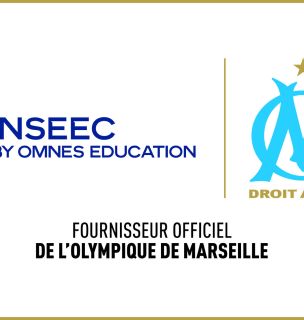“The Data Marketing Manager programme is aimed at students who have validated a Bac+4/5 with bases in marketing, database management, engineers or professionals in retraining, wishing to participate in the digital transition of a company in all sectors of activity (energy, transport, banking, trade, security, defence, etc.).”
Program director – Lyon Campus
Why choose MSc Data Marketing Manager ?
Data processing is gradually becoming a priority for companies and new professions are emerging. The Data Marketing Manager program is aimed at learners who have passed a Bac +4 with bases in marketing, statistics and database management, engineers or professionals in reconversion, wishing to participate in the digital transition of a company in all sectors of activity (energy, transport, banking, commerce, security, defence, etc.) In the current context of developments related to data exploitation, the Data Marketing Manager improves the efficiency of decision-making and makes the entire value chain more efficient. At the marketing level in particular, he masters the different types of consumers, segmentation and scoring methods in order to improve customer knowledge. It issues recommendations to refine the strategy and operational implementation. The MSc Data Marketing Manager targets the positions of Marketing & Research Manager, Consumer Insight Manager, Market Insight Manager, Data Manager, Marketing Data Officer, Consumer & Shopper Insight Manager, Consumer & Shopper Knowledge Manager, Consumer Intelligence Manager.
What are the objectives of the training programme?
- Design and deploy the company’s data-driven marketing strategy
- Implement data projects in agile mode to support the transformation
- Drive the company’s data collection, cleaning and analysis strategy
- Value the data, propose recommendations and support decision-making
Discover our MSc Data Marketing Manager

A 1 or 2 year degree to become a data expert
- 1st year of MSc: 441 hours
- 2nd year of MSc: 441 hours
How to apply for the MSc Data Marketing Manager at INSEEC ?
The prerequisites requested
The conditions for accessing the certification system (excluding VAE) are:
- To enter the 4th year (MSc1): a RNCP degree at level 6 and/or 180 ECTS validated in a course equivalent to the field concerned.
- To enter the 5th year (MSc2): a RNCP degree at level 6 and/or 240 ECTS acquired in a course equivalent to the field concerned.
Executive training (continuous professional) is subject to specific prerequisites with consideration of professional experience.
Want to know more about the MSc Data Analytics & Marketing Manager programme? Sign up for an Open Day!
Would you like to know more about the admissions requirements of our Data Marketing Manager program?
What are the Courses of the Master of Science Manager in Data Marketing ?
The courses presented below are given as an example, they may vary slightly depending on the teaching campus. The content of the courses is adapted each year to changes in the market and is updated before each start.
1st year courses
TRANSVERSAL & FUNDAMENTAL COURSES – 1ST YEAR
BUSINESS ENGLISH
This module of Business English applied to marketing allows learners to implement and apply the right vocabulary and attitude.
BUDGET MANAGEMENT & DASHBOARDS
- The objective is to acquire key skills in terms of budget management and reporting.
- Particular emphasis will be placed on the budget architecture, with the implementation of summary documents, project management control and its link with budget management, the execution and management of dashboards.
SOFTWARE & DECISION-MAKING TOOLS
- This module aims to deepen the skills of learners in IT to meet the demand of companies in terms of budget or commercial monitoring, project management, personnel management and communication: Excel, Word, PowerPoint, team work tools, business software.
NÉGOTIATION
- This seminar is focused on a negotiation in a national and international context.
- It will be necessary to take into account the cultural dimension and define its impact in an international negotiation.
- The national negotiation will focus on the sales process through role-playing.
TOOLS & PROFESSIONAL METHODS
This module allows learners to improve their CV and their posture, notably through simulations (business game, professional simulation, speaking, etc.); practical and professionalizing workshops (CV, professional social networks, coaching, etc.) as well as professional and master class conferences.
CORPORATE STRATEGY & BUSINESS PLAN
- This module aims to learn how to create a Business Plan or business plan: costed project design for business creation or development.
- Several steps are addressed: feasibility study, market targeting, opportunities and risks, strengths and weaknesses, communication, financing plan and profitability.
SPECIALIZED COURSES
DIGITAL MARKETING
Through case studies, this module aims to master the tools specific to marketing and communication on the Internet, mainly addressing:
- The latest trends in e-commerce (m-commerce / f-commerce…).
- The integration of Web 2.0 into marketing strategies.
- Presentation and mastery of Web analytics tools.
- Development of a marketing and commercial strategy on the different social media.
LAW APPLIED TO E-COMMERCE
- Know the positioning of the company in the legal environment.
- Know the legal constraints governing online commerce, and more broadly internet business
TECHAWAY : START WITH PYTHON
- Understand the basics of programming in Python, focusing on variables, loops and data manipulation with Pandas.
- Provide a solid foundation for those who wish to evolve in data science or improve their technical skills.
- Gradually acquire the skills needed to solve real data issues.
WEB ANALYTICS
- Overview of website creation solutions (CMS, PHP development, WYSIWYG tools…).
- Presentation of the different analysis tools, website traffic, main indicators: origins, conversion rate, time spent…
CHALLENGES & GENERALITIES OF DATA
The objective of this course is to give an overview of the Big Data ecosystem and how these technologies can help achieve new goals through new data analysis techniques, by offering a fundamental introduction to the main components of all new technologies related to Data and its use cases in various fields.
DATA & SOFTWARE PROGRAMMING
The programming languages R and Python will be presented and implemented in order to understand their interests from a managerial point of view and thus be able to choose the most relevant analysis methods.
DATA ANALYTICS
Data analytics is the exploration, transformation and analysis of data in order to identify trends and patterns that reveal relevant actionable information and improve efficiency, which helps optimize decision making. A modern data analytics strategy allows systems and companies to act based on automated analyses in real time, which ensures immediate and impactful results.
DATA-DRIVEN MARKETING
Data-driven marketing is a process used by marketers to gain insights and identify trends about consumers and their behavior – what they buy, the effectiveness of ads and how they browse.
TECHAWAY : DATABASES AND DATA QUALITY
- Deepen your knowledge of SQL and Python for effective data management.
- Learn advanced cleaning and validation techniques to ensure the integrity and accuracy of data in a professional context.
- Discover how to transform raw data into reliable and actionable information.
- This module is essential to ensure relevant and quality data analyses.
UNDERTAKE A DIGITAL TRANSFORMATION
- This module trains learners to pilot and implement a digital transformation within an organization.
- They will learn to identify digitalization opportunities, define a digital strategy aligned with the company’s objectives, manage transformation projects, support teams in change and measure the return on investment.
- Learners will acquire the necessary skills to successfully carry out complex digital transformation projects and succeed in their transition to digital.
EXAMS & SUPPORT
WRITTEN EXAMS
The 2nd year courses
DATA-DRIVEN MARKETING STRATEGY – 2ND YEAR
DATA GOVERNANCE & LAW APPLIED TO NEW TECHNOLOGIES
- The economic and societal potential of data is enormous: it can enable new products and services based on new technologies, make production more efficient and provide tools to fight against societal challenges.
- Overview of the laws around data.
BEHAVIOR OF THE E-CONSUMER
- From large amounts of data, coming from very diverse sources, deduce regular or potential behaviors, through modern targeting techniques, segmentation and scoring of e-consumers.
- Mastering real-time behavioral analysis to promote multi-channel promotions and influence consumer behavior directly at the point of sale (or on the website).
OPEN DATA & STRATEGIC ISSUES
- This module allows you to understand and master the challenges related to open data.
- Discover how to collect, analyze and leverage this data to develop new products, services or economic models.
- Learn to identify opportunities and challenges related to open data, as well as to comply with current regulations.
- Integrate Open Data into the company’s strategy and become a player in digital innovation.
TARGETING & DATA MARKETING
- Analyze large volumes of data at the right time in order to evaluate those coming from new sources, such as traffic from social media or clicks made by a prospect on a company’s website, making the targeting and segmentation of profiles as precise as possible.
- Know the consumer’s position in real time.
- Use the right tools to collect and leverage this information.
- Study analysis models and implementation simulations.
- Analyze the consumer’s attendance or purchasing behavior in order to optimize decision-making.
IT SECURITY & DATA PRIVACY
- Master the international regulatory environment of data management, both in terms of collection and sharing.
- Identify the different approaches to personal data protection.
- The consent of individuals on their personal data.
- Integrate the rapid changes in legislation at the state level and their impact on the use and strategies of tomorrow’s companies.
DATA PROJECT IN AGILE MODE
AGILE METHODS & INNOVATION
- This course explores the application of agile methods to the field of data analysis.
- It addresses the fundamental principles of these methods, such as Scrum and Kanban, and their adaptation to data projects.
- Learners will see how to manage data analysis projects in an iterative and collaborative way, define sprints, prioritize tasks, and adapt to changes.
- The focus will be on integrating agile methods with specific data science tools and techniques, in order to foster innovation and efficiency in solving complex data-related problems.
BIG DATA SERVICES MARKET
- This module will immerse you in the heart of the dynamic market for Big Data services.
- You will discover the different players, service offers, economic models and challenges of this growing market.
- You will learn to identify the needs of companies in terms of Big Data, to design customized solutions and to evaluate their economic viability.
- This module will give you the keys to position yourself as an expert in this market and seize the opportunities it offers.
TOOLS & PROFESSIONAL METHODS
- This module allows learners to improve their resume and their posture through, in particular, role-playing exercises (business games, professional simulations, speaking sessions, etc.);
- Practical and professionalizing workshops (CV, professional social networks, coaching, etc.) as well as career conferences and master classes.
DATA PROCESSING
- Digital makes it possible to obtain a colossal set of information on individuals.
- However, without immediate processing, this data quickly becomes obsolete.
- Know the sources of information available to the Marketer to accurately describe the situation or desires of its clients and prospects in real time.
DATABASE PROCESSING TOOLS
- Analysis of study data: descriptive, explanatory or predictive analyses of simple or complex treatments.
- Textual analysis and CRM: understand the possibilities offered by textual analysis tools to apprehend data with a high degree of automation.
- Improve the quality of the database (homogeneity, qualification, management of inactive contacts, etc.).
DATA MANAGEMENT
TECHAWAY : DATA PROCESSING AND GENAI
- Deepen advanced data analysis using.
- Python and by exploiting the potential of Generative Artificial Intelligence (GenAI).
- Learn how AI techniques can improve data interpretation and communication via prompt engineering.
- Apply data processing strategies to concrete cases.
- Develop an essential critical mind to evolve in the field of data.
ALGORITHM & DATABASE
- Stakes of the algorithm in the value chain of companies.
- Algorithms now allow machines to learn how to detect patterns or models among millions of data: search for groups of similar elements.
- Forecasting a sequence.
- Predicting a continuous attribute.
PROGRAMMING LANGUAGES
- The programming languages R and Python will be presented and implemented in order to understand their interests from a managerial point of view and thus be able to choose the most relevant analysis methods.
WEB ANALYTICS
- Introduce a qualitative dimension in addition to the quantitative aspect.
- This approach will explore crucial aspects such as the implementation and analysis of Heatmaps, A/B Testing, creation and refinement of audiences, implementation of Insight capture pages and retargeting.
DATA MINING
- Data Mining is defined as a process used to extract usable data from a broader set of raw data.
- Companies can learn more about their customers and develop more effective strategies related to the various business functions, enabling them to leverage resources in a more optimal and judicious manner.
VALORIZATION OF DATA
PREDICTIVE ANALYTICS & DATA INTELLIGENCE
- Monitor and analyze the online data that is most relevant to the company’s activity.
- Identify the right information at the right time and place, in order to improve decision-making and optimize the organization’s performance.
- Choose the appropriate tools to understand and capitalize on this new reality.
- Anticipate changes in markets and customer behavior.
- Data Mining applied to Customer intelligence.
- Implement a Customer intelligence project in a company.
DECISION-MAKING STATISTICS
- Know the basic tools of data analysis.
- Explore, describe and interpret data in their multidimensional aspect.
- Ask the right statistical questions in line with a marketing problem.
- Perform simple statistical processing in order to issue marketing recommendations.
SCORING & PREDICTIVE MARKETING
- Determine the value of customers and prospects by developing scores specific to an activity, based on all the data made available.
- Develop an acquisition or loyalty strategy based on the defined objectives.
- Use scoring to better target, avoid SPAM-related complaints, email unsubscriptions, and manage marketing pressure in real time.
- Beyond targeting, the real added value of data also lies in the predictability of consumer behaviors.
- Predict the future behavior of customers.
- Identify the most profitable, the most influential.
TECHAWAY : DATAVISUALISATION AND DATA ANALYSIS
- Deepen data analysis and visualization with a focus on user experience (UX/UI).
- Train participants to use Looker Studio to create interactive and impactful dashboards, promoting better data communication.
- Turn complex data into clear visual narratives to facilitate strategic decision making.
- This course develops essential analytical skills to play a key role in Business Intelligence.
WRITTEN EXAMS & DEFENSE
EXAMS
- Written exams.
- Memory defense.
What are the beginnings and study schedules ?
Two intakes per year are organized, in February/March and September/October. To check the opening of each school year, contact the admissions service directly.
The pace of courses can differ depending on the campus and whether the training is carried out under an internship agreement (initial) or a professionalization/learning contract (continuous).
The work-study contract must be signed for a period of 12 months (MSc2) or 24 months (MSc1 + MSc2).
To find out the duration of the contract during the delayed start period, contact the campus admissions service that interests you directly.

What are the career opportunities after a MSc Manager in Data Marketing ?
The job of a Manager in Data Marketing can be held under different job titles :
- Marketing Data Analyst
- Business Analyst
- Chef de projet Data
- Consultant(e) Data / Consultant(e) BI
- Manager Data
To consult the detailed job sheets by specialization.
What are the business skills blocks developed for the RNCP Manager in Data Marketing title ?
Professional certification prepares the following skill sets :
- Design and deploy the company’s data-driven marketing strategy
- Implement data projects in agile mode to support the transformation
- Drive the company’s data collection, cleaning and analysis strategy
- Value the data, propose recommendations and support decision-making
Description of the procedures for acquiring certification by capitalization of skill blocks and/or correspondence
Certification is obtained by:
- The validation of four blocks of skills common to all courses (obtaining a score greater than or equal to 10/20 for each block of skills).
- Completion of a period of 132 days minimum on the second year of the course (MSc 2).
Professional certification
Professional certification of « Data Marketing Manager », NSF 312 and 316 codes, issued by INSEEC MSc (INSEEC Executive Education, CEE-SO, CEE-RA, CEFAS, MBA INSTITUTE, CEE-OUEST, CEE-M), registered under number 39591 at the RNCP (National Directory of Professional Certifications) by decision of the Director General of France Compétences of October 1, 2024.
Certification is issued by capitalization of all skill blocks. Each skill in a block must be confirmed to obtain the skill block. Partial validation of a block is not possible. It is also accessible through the Validation of Acquired Experience.
Find the skill blocks associated with this RNCP title by clicking here.
What are the teaching methods of the MSc Data Marketing Manager ?
Teaching methods
- Lectures and interactive courses
- Scenarios through collective and/or individual case studies carried out by students
- Conferences, seminars and visits with pedagogical scope
Assessment methods
- Individual and/or group case studies
- Individual and/or group oral presentations
- Individual and group papers
- Applied research dissertation with individual oral presentation
Methods and tools
- Evaluation procedures are carried out face-to-face, in the form of continuous monitoring or final examinations carried out in the form of partial examinations.
What are the 2025/2026 tuition fees to integrate the MSc Data Marketing Manager program ?
FALL INTAKE – 2025
Initial training:
- MSc1 : €10,990
- MSc2 : €12,950
Apprenticeship program:
- 24 months: €23,490 before tax
- MSc2: €13,890 before tax
International students pack
Mandatory fee of €700 for exclusive support services for international students living outside the European Union.
SPRING INTAKE – 2026
Initial training:
- MSc1 : €10,990
- MSc2 : €12,950
Apprenticeship program:
- 24 months: €23,490 before tax
- MSc2: €13,890 before tax
International students pack
Mandatory fee of €700 for exclusive support services for international students living outside the European Union.
In the context of work-study training, tuition fees are payable by the OPCO and the company signing the contract.
Do you have any questions about work-study or our school in general? Consult our frequently asked questions.
VAE/VAP
- VAE: €4,800 before tax
- VAP: €850 before tax
International students pack
Mandatory fee for exclusive support services for international students living outside the European Union.
- Fall intake (2025) – September/October: €700
- Spring intake (2025) – February/March: €700
Application fee
The application fee is €80.
What kind of financial aid is available?
INSEEC offers several financial aid schemes:
- The alternating rhythm, in internship or work-study contract;
- The right to training via the CPF;
- Banking partnerships.
the key figures for the RNCP title 'Digital marketing and communications manager'
95%
National success rate – Class of 2024
98%
Presentation rate – Promo 2024
68%
Overall insertion rate (233 respondents out of 688) – Promo 2023
78%
6-month satisfaction rate – Promo 2023
The details are available on this document made available to you (national results and by regional certifier).
What is the Disability policy in our school ?
The OMNES Education Group pays particular attention to the societal environment, including the disability dimension. Indeed, we believe that students with disabilities should not have any problems in pursuing their studies and starting a professional career. We accompany them to facilitate their access to the premises, offer them personalized advice as well as adapted accommodations throughout their school career.
Accessibility of premises: all our campuses are accessible to people with disabilities.
To learn more about the OMNES Education Group’s disability policy, click here.
Contacts for disability referents by campus:
- Bordeaux : Maxime DOUENS – mdouens@inseec.com
- Lyon : Anissa GASMI – agasmi@inseec.com
- Rennes : Laura LE CALVEZ – llecalvez@omneseducation.com
- Paris : Farid HAMAD – fhamad@inseec.com
- Chambéry : Marianne FERLAY – mferlay@inseec-edu.com
- Marseille : Océane VALOTTI – ovalotti@omneseducation.com
- Toulouse : Amanda MARNEIX – amarneix@omneseducation.com
News

June 2024
INSEEC hosted the CFNews Grands Prix de la Croissance Externe Sud Ouest for the second year running
Read more





